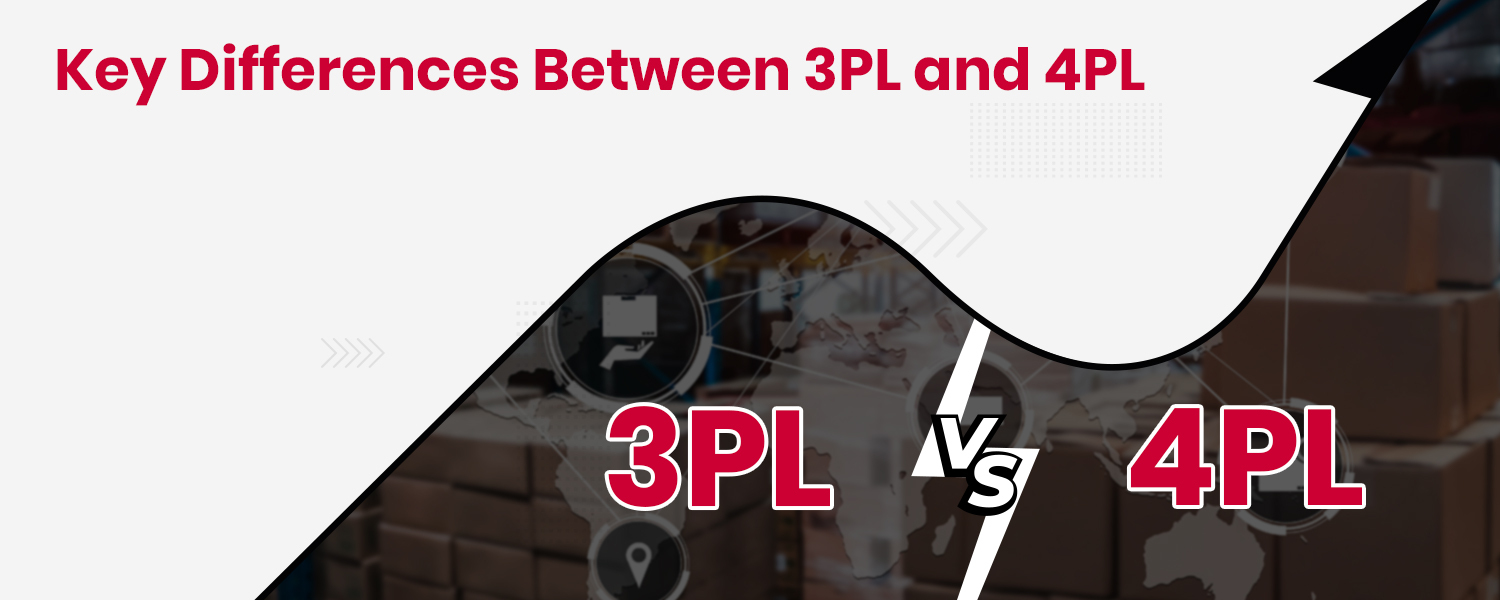In eCommerce, the need for proficient logistics solutions is the linchpin of your entire operation. Many consumers won’t return to a brand after just one poor delivery experience. With margins this slim, can you afford to make the wrong call? Choosing between 3 PL or 4PL logistics services becomes crucial and complex.
In the red corner, we have 3PL—your tried and true logistics partner, specialising in everything from warehousing to dispatch. In the blue corner, 4PL—a master strategist who takes the logistics chessboard and not only moves the pieces but also designs the game.
So, how do you pick the right champion for your business?
In today’s post, we’ll delve into the mechanics of 3PL and 4PL services, compare their features, advantages, and perhaps disadvantages, and answer which one is right for your eCommerce enterprise.
What is 3PL?
In layman’s terms, a third-party (3PL) service provider takes care of the “grunt work” of your eCommerce logistics. It acts as an extension of your company, handling critical operational aspects ranging from warehousing and transport to inventory management and even returns. The beauty of it all? You only pay for the exact storage space and staff time you need, making it a scalable solution perfect for growing eCommerce businesses.
To bring this concept to life, let’s look at Amazon as an example. When you hear the name “Amazon,” the first thing that might come to mind is the online marketplace where you can purchase virtually anything under the sun. However, what often goes unnoticed is Amazon’s prowess in third-party logistics (3PL) services. From small mom-and-pop retailers to global giants, many businesses leverage Amazon’s logistics capabilities to streamline their operations. The retail giant offers two main 3PL services—Fulfillment by Amazon (FBA) and Amazon Multi-Channel Fulfillment (MCF).
Amazon’s FBA and MCF services stand as a testament to what 3PL services should aspire to be—efficient, technology-driven, and comprehensive. From warehousing to transportation, inventory management to multi-channel fulfillment, Amazon takes care of the A to Z logistics, allowing you to concentrate on growing your business.
What is 4PL?
A 4PL integrates various elements of a supply chain and serves as a singular interface between you, the client, and multiple logistics service providers. Think of 4PL as your ultimate logistics partner that manages and streamlines every aspect of your supply chain. To put it technically, 4PL offers an integrated logistics solution that assesses, designs, builds, runs, and measures supply chain solutions on behalf of its clients.
For example, you own a fast-growing eCommerce business that sources handmade crafts from multiple countries and sells them globally. As orders surge, you find it increasingly complicated to manage international shipping regulations, customs duties, multi-modal transportation, and inventory management across diverse markets.
A 4PL provider analyzes your entire supply chain, aligns it with your business goals, and collaborates with various 3PLs, shipping companies, and even governmental bodies to ensure a smooth operation. This frees you up to focus on marketing strategies, customer engagement, and product innovation, secure in the knowledge that a single, competent entity is managing your logistics.
3PL vs 4PL – The Key Differences
Core Competencies and Focus
3PL providers are execution-oriented partners. Their forte lies in tactical operations such as transportation, warehousing, and distribution.
On the other hand, 4PL providers act as your logistics strategist and conductor, offering a comprehensive, end-to-end supply chain solution.
Vendor Relationship
When it comes to vendor relationships, 3PLs often have specific contracts and autonomy. They might be excellent at negotiating freight rates or managing warehouse spaces, but they usually work within the bounds of their operational mandate.
In contrast, 4PLs serve as a unifying interface between you and multiple vendors. They synchronise every stage of your supply chain, offering streamlined services. In doing so, they take vendor management to a whole new level, acting as an integrated solution partner rather than just another service provider.
Systems and Assets
A 3PL might own or lease their trucks and warehouses or develop logistics software. Their systems are often designed for specific functions, such as inventory management or route planning.
4PLs, however, typically do not own these assets. Their mastery lies in leveraging a network of 3PLs and other resources effectively. They usually employ sophisticated enterprise-level software that integrates various aspects of the supply chain, offering a bird’s-eye view of operations that’s as detailed as it is broad.
Costs and Overhead
When considering costs, 3PLs often appear less expensive on the surface. You pay for specific services you need, which might make budgeting seem straightforward. However, as your logistics requirements grow more complex, you may juggle multiple 3PLs, which can create inefficiencies and drive up costs.
In contrast, a 4PL offers a more consolidated approach. While the initial setup cost may be higher, their comprehensive management often results in long-term cost-effectiveness. Their holistic oversight can identify inefficiencies and redundancies that you weren’t even aware of, leading to substantial cost savings over time.
Order Fulfillment
3PLs are experts at picking, packing, and shipping—they receive orders, prepare items for shipment, and get them to their destination. Their focus is on executing these tasks as efficiently as possible, making them an excellent choice for businesses at an early stage or with straightforward logistics needs.
4PLs, however, manage the entire journey of an order from your supplier to the customer’s doorstep. They coordinate all the involved 3PL activities and may even oversee customer service and returns.
Supply Chain Optimisation
3PLs excel at optimising individual aspects of the supply chain. Whether it’s reducing warehouse storage costs or shortening delivery times, their focus is laser-sharp but generally limited to specific operations.
In contrast, 4PLs offer a macro view. They look at your entire supply chain, identify bottlenecks, and employ advanced analytics and technologies, such as Artificial Intelligence (AI) and Machine Learning (ML), and often leverage strategies like hub and spoke model to improve the overall performance of logistics in supply chain management.
Customer Communications
When it comes to customer interaction, 3PLs usually have a limited role. They might provide tracking information and handle returns, but their engagement often ends there.
4PLs, however, consider customer communication as an integral part of the supply chain. They understand that how you interact with your customers before, during, and after the purchase is a critical factor in customer retention and, ultimately, business success. Hence, they work strategically to align customer service protocols with overall business objectives.
Which is the Best for Your e-commerce Business?
Deciding between a 3PL and a 4PL service can feel like standing at a crossroads, each path leading to a vastly different landscape of opportunities and challenges.
For start-ups and small to mid-sized eCommerce enterprises, a 3PL could be the better choice for several reasons. They’re great at “doing the doing,” meaning they’ll pick, pack, and ship your products efficiently. They usually offer straightforward pricing structures that can be easier to budget for and manage.
On the flip side, if you’re overseeing a sprawling eCommerce empire, a 4PL can be a godsend. When your logistics involve multiple vendors, international shipping, customs clearances, and intricate reverse logistics, the 4PL coordinates all these complex parts into a streamlined supply chain.
Why eCommerce Businesses Should Trust 3PL Services Like NimbusPost
Gone are the days when businesses could afford to stumble through the complex maze of supply chain logistics. Now, excellence in logistics is a necessity for survival. NimbusPost is a new-age tech-enabled logistics solution that elevates your eCommerce logistics to a new level.
It is a streamlined platform where you can compare offerings from various logistics providers, 3PL and 4PL, and make an informed decision alongside an arsenal of value-added services like same-day deliveries, omnichannel support, and real-time tracking that enriches the customer experience.
Single-Window, Tech-Enabled Solutions
NimbusPost offers a unified and technology-driven solution for eCommerce logistics, which is one of its most impressive features. Handling multiple vendors can be a difficult and inefficient process. However, NimbusPost provides a streamlined platform that combines multiple logistics options into a single window, supported by advanced technologies such as Artificial Intelligence (AI) and Machine Learning (ML). With this platform, you can compare rates, performance metrics, and delivery timelines. This data-driven approach allows you to make informed decisions that are tailored to your unique business requirements.
Expansive Global and Domestic Network
Geographical reach can be a limiting factor for growing businesses. NimbusPost counters this with its expansive network. Domestically, the service covers more than 29,000 pin codes. Globally, NimbusGlobal allows for cross-border trading across 196+ countries. If your business has been eyeing international markets, the seamless global logistics solutions from NimbusPost can be your launchpad for worldwide expansion.
Cost-Effectiveness and Operational Efficiency
Cost is often the elephant in the room when it comes to outsourcing logistics. While it’s true that managing logistics in-house might seem like the cheaper option at first glance, the hidden costs can add up quickly. From warehousing to last-mile delivery, the logistics chain has multiple components that require specialised focus. NimbusPost offers competitive rates, bulk shipment handling, and quick COD remittance. The platform even allows you to handle Return-to-Origin (RTO) orders more efficiently, further adding to cost savings.
Specialised Customer Support
NimbusPost provides robust customer support, ensuring that any hiccups in the logistics process are swiftly addressed. This alleviates one of the most significant pain points in logistics management, allowing you to focus on other core areas of your business.
Cart Abandonment and Revenue Potential
Poor shipping options or lengthy delivery timelines can deter potential customers. NimbusPost’s fast and reliable service can help you minimise cart abandonment, ultimately leading to higher revenue potential.
Real-Time Tracking and Customer Experience
Nothing can sour a customer’s experience more quickly than a lack of transparency in the shipping process. NimbusPost offers real-time tracking features, which not only keep your customers informed but also significantly reduce the escalation of delivery-related issues.
Conclusion
Choosing a logistics partner can feel like playing a high-stakes game. Each move you make has far-reaching implications for your eCommerce business, influencing not just your operational efficiency but also your customer experience, scalability, and bottom line.
For smaller or more specialised businesses, the cost-effectiveness and specialisation of 3PLs might be the smart bet. For larger, more complex operations, the strategic insights and holistic services offered by 4PLs can provide a significant edge.
With technology backed by AI and ML and a global reach that bypasses customs headaches, NimbusPost is like your in-house logistics strategist without the overhead.




